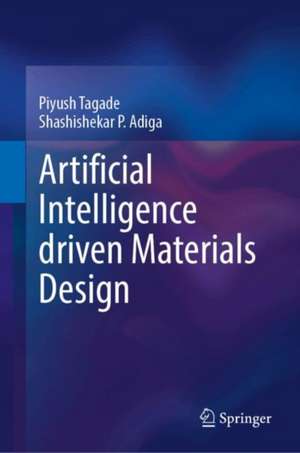Artificial Intelligence driven Materials Design
Autor Piyush Tagade, Shashishekar P. Adigaen Limba Engleză Hardback – 13 iun 2025
Preț: 599.88 lei
Preț vechi: 659.20 lei
-9% Nou
Puncte Express: 900
Preț estimativ în valută:
114.79€ • 122.75$ • 95.71£
114.79€ • 122.75$ • 95.71£
Carte nepublicată încă
Doresc să fiu notificat când acest titlu va fi disponibil:
Se trimite...
Preluare comenzi: 021 569.72.76
Specificații
ISBN-13: 9789811922619
ISBN-10: 9811922616
Pagini: 200
Ilustrații: Approx. 200 p. 100 illus. in color.
Dimensiuni: 155 x 235 mm
Ediția:2024
Editura: Springer Nature Singapore
Colecția Springer
Locul publicării:Singapore, Singapore
ISBN-10: 9811922616
Pagini: 200
Ilustrații: Approx. 200 p. 100 illus. in color.
Dimensiuni: 155 x 235 mm
Ediția:2024
Editura: Springer Nature Singapore
Colecția Springer
Locul publicării:Singapore, Singapore
Cuprins
1. Introduction.- 2. AI algorithms and Computational methods.- 3. Material property optimization using genetic algorithms.- 4. Monte Carlo Tree Search, Reinforcement Learning.- 5. ML for Materials Modeling: Machine Learned DFT and Force Fields.
Notă biografică
Dr. Piyush Tagade obtained his PhD in Aerospace Engineering from Indian Institute of Technology Bombay, India in 2010. He currently works as an AI Technologist at Rolls-Royce Singapore Pte Ltd. Prior to joining Rolls-Royce, he was Research Staff Member at Samsung Advanced Institute of Technology, Samsung R&D Institute, Bangalore, India. Before joining Samsung, he also worked as a postdoctoral researcher at Massachusetts Institute of Technology, USA and Korea Advanced Institute of Science and Technology, Republic of Korea. His research interests include developing AI-driven solutions for engineering problems, application of AI for materials discovery, deep learning, Bayesian inference, uncertainty propagation, data assimilation and optimization. He has co-authored a book on mathematical modeling of Li-ion batteries, has over 40 publications and several patents.
Dr. Shashishekar P. Adiga obtained his PhD inMaterials Science and Engineering from North Carolina State University in 2003. He currently heads the Materials and Simulations team at Samsung Advanced Institute of Technology (SAIT), India in Bangalore. Prior to joining SAIT, Dr. Adiga worked at Argonne National Laboratory, Kodak Research Labs, Lockheed Martin Advanced Technology Laboratories and Shell Technology Center. His research interests include computational materials science, materials for energy storage and conversion, automated materials discovery, functional and device materials, application of AI in materials discovery and manufacturing. He has over 38 publications, and several patents.
Dr. Shashishekar P. Adiga obtained his PhD inMaterials Science and Engineering from North Carolina State University in 2003. He currently heads the Materials and Simulations team at Samsung Advanced Institute of Technology (SAIT), India in Bangalore. Prior to joining SAIT, Dr. Adiga worked at Argonne National Laboratory, Kodak Research Labs, Lockheed Martin Advanced Technology Laboratories and Shell Technology Center. His research interests include computational materials science, materials for energy storage and conversion, automated materials discovery, functional and device materials, application of AI in materials discovery and manufacturing. He has over 38 publications, and several patents.
Caracteristici
Highlights the application of Machine Learning (ML) and Deep Learning (DL) to Materials Design Includes sample codes and example problems to help readers gain hands-on experience Presents novel techniques in inverse design of materials- an emerging field of materials desig
